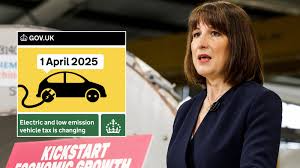Rachel Reeves Proposes Significant Car Tax Changes

Introduction
The topic of car tax changes has recently gained traction in the political arena, particularly following Labour’s Shadow Chancellor Rachel Reeves’ announcement. Proposed alterations to vehicle taxation are poised to have substantial implications for UK motorists, emphasizing environmental concerns and fiscal responsibility. As discussions unfold, understanding the proposed changes and their potential consequences becomes crucial for drivers across the nation.
Details of the Proposed Changes
Rachel Reeves, at a recent press conference, outlined her plans to implement a revised taxation framework aimed at promoting greener vehicles and reducing carbon emissions. The proposal includes increasing taxes on higher-emission vehicles while offering tax incentives for electric and hybrid models. These changes are presented as part of the Labour Party’s broader goals to address climate change and encourage the use of sustainable transport solutions.
In addition to the environmental perspective, Reeves highlighted the economic dimension, stating that these adjustments could generate revenue to support public services, including investment in public transport infrastructure. This is particularly significant in light of the economic challenges posed by the current climate and the need for a greener future.
Reactions and Implications
The reaction to Reeves’ proposals has been mixed. Environmental advocates have generally welcomed the initiative, seeing it as a positive step towards reducing greenhouse gas emissions. However, concerns have been raised by motorists, particularly those who may struggle with the increased costs associated with higher-emission vehicles. Critics argue that the changes could disproportionately affect low- and middle-income families who rely on older vehicles.
Consequently, Labour’s commitment to introducing exemptions or subsidies for certain demographic groups has become a focal point of the discussion. The Shadow Chancellor acknowledged the need for a balanced approach that considers both environmental impact and economic feasibility for everyday drivers.
Conclusion
The proposed changes to car tax by Rachel Reeves could significantly reshape the automotive landscape in the UK. As the debate continues, motorists should remain informed about the details of these potential changes, their environmental implications, and any financial incentives available for transitioning to greener vehicles. Observers await further developments as Labour positions itself ahead of the next election, with an eye on how these policies might resonate with the electorate.









